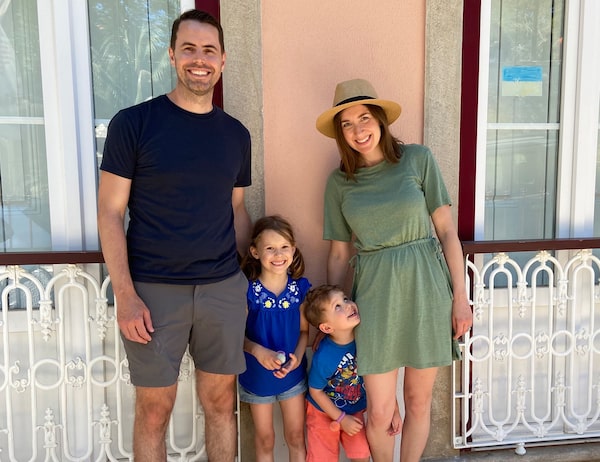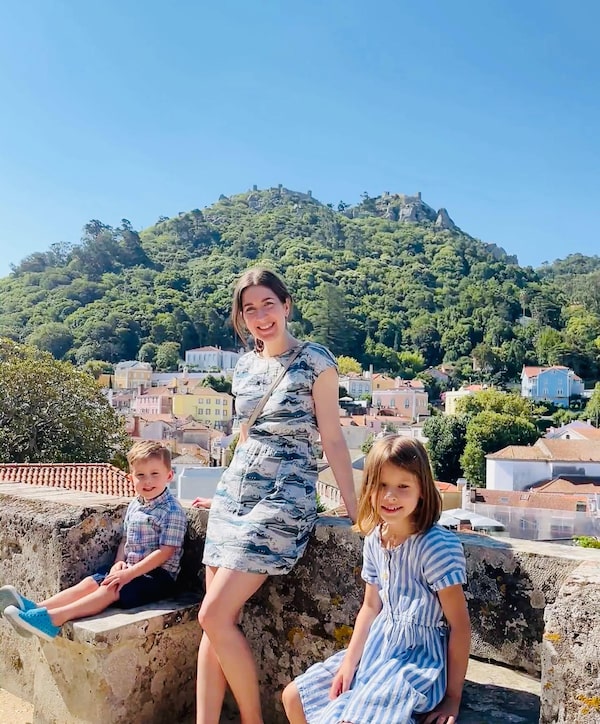
Andrew Johnston, Mabel Johnston, Teddy Johnston and Bianca Johnston, in Sintra, Portugal, where they stayed for July with Boundless Life.Supplied
Working remotely while living abroad took off during the pandemic, as Canadians used their newfound work-from-home abilities to pack up their laptops and do their jobs while seeing the world.
So who’s doing it? According to Nomad List, an online community that connects remote workers with places to stay, the average digital nomad is a 33-year-old single male.
But that’s not because families aren’t interested, says Marcos Carvalho, the Canadian co-founder of Boundless Life. His company is trying to make it easier for families who don’t want the hassle of finding a school for their kids at their destination, offering education for children ages 1 to 12, as well as a place to stay, a co-working space and a ready-made community of others in the same position.
“There is high demand,” says Mr. Carvalho, whose business has launched two locations so far: Sintra, Portugal, and Syros, Greece. A third location in Pistoia, Italy, will launch in January.
The proposition for those who choose Boundless Life instead of just figuring it out on their own is that it removes the hassle of lining up all the elements individually, and offers schooling that is mainly in English in countries where that is typically not the case, says Mr. Carvalho.
He and his co-founders, Mauro Repacci, Rekha Magon and Elina Zois, have all lived in several countries, and had been looking for something like this for their own families before finding nothing and starting the business.
He says 70 per cent of clients buy 12-month packages, which allows them to move between locations every three months – the length of Boundless Life’s school term – providing curriculum continuity for the children.
“It’s a lot of families looking to ‘slow travel,’ discover new cultures, have cultural immersion, but be able to commit to their daily responsibilities,” he says.
Among those responsibilities, for most people, are making money and paying the bills, which will now be piling up in both the new location and back home. Boundless Life costs about $7,000 a month for a two-bedroom unit and two kids in school, says Mr. Carvalho. He says most patrons rent out their primary homes and cut down their hometown expenses as much as possible in order to fund the trip.
“A family having similar standards in Toronto are saving money by living the Boundless Life,” he contends. “It’s the same in Vancouver, or a large city in the U.S. or Europe. It becomes very affordable if you add up housing, education and the communal activities.”
It’s not quite working out like that for Bianca and Andrew Johnston, who ditched Toronto for Sintra for the month of July. Boundless Life offers a one-month package for people looking to test out the concept, or use it more like a vacation, but the price is higher than for those who choose extended stays.
It also increases based on accommodation size, so with a three-bedroom place and two kids in school, the family paid about $12,000 for one month. Andrew, 40, says they funded it from a vacation budget they’ve been saving over several years, noting the lack of things to do during the pandemic generated additional savings as well.

Ms. Johnston and her children in Sintra.Supplied
Bianca, 39, says if they did it again they would start trying to rent out their home earlier (they did not succeed in renting this time). Her job is in market research at Shopify, which has gone fully remote since the start of the pandemic. While in Sintra she worked some of the time. Andrew is on a career break after leaving a 16-year stint at Labatt in the spring.
Bianca says she views it as a successful test of working abroad and would go again – maybe next time, for longer.
“Everything else is so fresh and stimulating, even though I was working it still felt like a vacation,” she says. “And we didn’t have to wait until we’re both on a break.”
For those considering a test or a longer-term stay, cash-flow planner Kathryn Mandelcorn – a certified money coach at Spring Financial Planning in Vancouver – suggests making two separate budgets, one for expenses at home and one for expenses abroad.
She says it can be easy to get into “holiday mode,” where critical thinking about spending goes out the window, so it makes sense to talk with everyone in the family about what type of experiences are important, and set limits to avoid feeling like “you’re doling out money every which way.”
Setting a budget for special activities and everyday spending can prevent overdoing it, but it can also be a way to give kids some autonomy over their choices, she says.
As far as taxes go, chartered professional accountant Dayna Holland says the duration of a trip could drastically affect a family’s long-term financial situation. Ms. Holland, who is based in North Vancouver, explains that if a home rental stops being temporary in the eyes of Canada Revenue Agency, then its owners can lose a portion of the principal residence tax exemption. That means that if the home is sold, they would have to pay tax on the gains.
Those planning to rent out their house while travelling can submit an election to CRA stating that it is temporary and asking it to remain considered as their primary residence for up to four years. Ms. Holland recommends families sort that out before leaving, and consult a tax accountant or an expatriate tax specialist to make sure they understand what they need to do in Canada, and also what happens when they arrive in the other country. There could be tax implications there as well.
Ms. Holland also notes that since Canada taxes individuals based on their residency, those leaving the country for as little as six months plus a day (183 days) could lose their Canadian residency, which will trigger a tax on any gains made on their assets in the months before their departure.
You are deemed to have disposed of any asset that you have in Canada, she says, noting also that provinces typically require about 183 days residency for someone to qualify for government health insurance.
Are you a young Canadian with money on your mind? To set yourself up for success and steer clear of costly mistakes, listen to our award-winning Stress Test podcast.